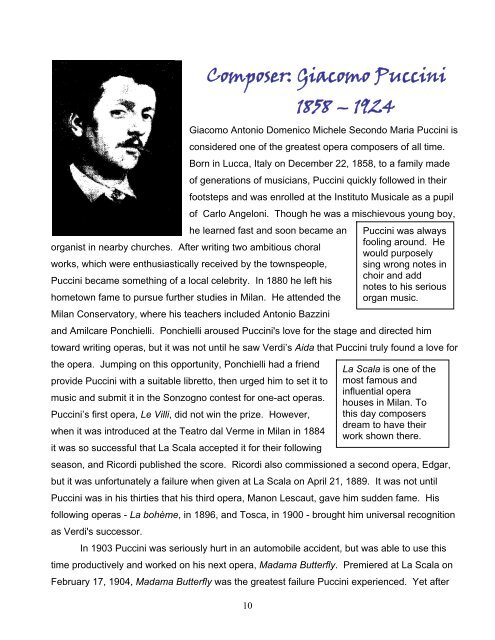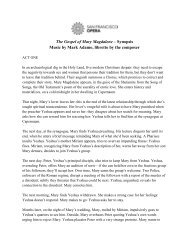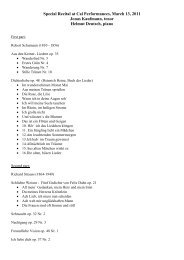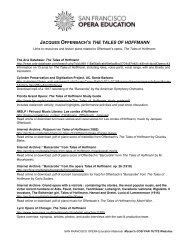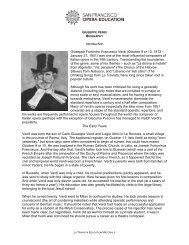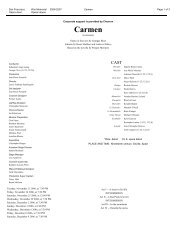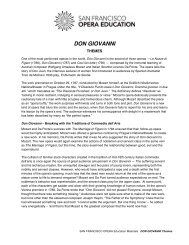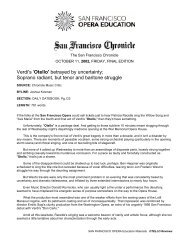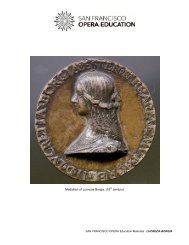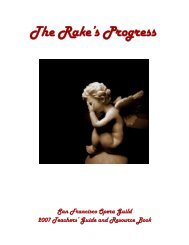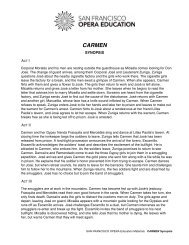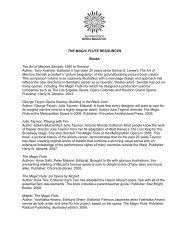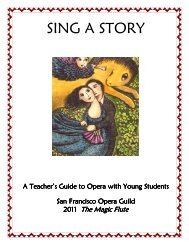You also want an ePaper? Increase the reach of your titles
YUMPU automatically turns print PDFs into web optimized ePapers that Google loves.
Composer: Giacomo Puccini<br />
10<br />
1858 – 1924<br />
Giacomo Antonio Domenico Michele Secondo Maria Puccini is<br />
considered one of the greatest opera composers of all time.<br />
Born in Lucca, Italy on December 22, 1858, to a family made<br />
of generations of musicians, Puccini quickly followed in their<br />
footsteps and was enrolled at the Instituto Musicale as a pupil<br />
of Carlo Angeloni. Though he was a mischievous young boy,<br />
he learned fast and soon became an Puccini was always<br />
fooling around. He<br />
organist in nearby churches. After writing two ambitious choral<br />
would purposely<br />
works, which were enthusiastically received by the townspeople, sing wrong notes in<br />
choir and add<br />
Puccini became something of a local celebrity. In 1880 he left his<br />
notes to his serious<br />
hometown fame to pursue further studies in Milan. He attended the organ music.<br />
Milan Conservatory, where his teachers included Antonio Bazzini<br />
and Amilcare Ponchielli. Ponchielli aroused Puccini's love for the stage and directed him<br />
toward writing operas, but it was not until he saw Verdi’s Aida that Puccini truly found a love for<br />
the opera. Jumping on this opportunity, Ponchielli had a friend<br />
<strong>La</strong> Scala is one of the<br />
provide Puccini with a suitable libretto, then urged him to set it to most famous and<br />
influential opera<br />
music and submit it in the Sonzogno contest for one-act operas.<br />
houses in Milan. To<br />
Puccini’s first opera, Le Villi, did not win the prize. However, this day composers<br />
dream to have their<br />
when it was introduced at the Teatro dal Verme in Milan in 1884<br />
work shown there.<br />
it was so successful that <strong>La</strong> Scala accepted it for their following<br />
season, and Ricordi published the score. Ricordi also commissioned a second opera, Edgar,<br />
but it was unfortunately a failure when given at <strong>La</strong> Scala on April 21, 1889. It was not until<br />
Puccini was in his thirties that his third opera, Manon Lescaut, gave him sudden fame. His<br />
following operas - <strong>La</strong> bohème, in 1896, and Tosca, in 1900 - brought him universal recognition<br />
as Verdi's successor.<br />
In 1903 Puccini was seriously hurt in an automobile accident, but was able to use this<br />
time productively and worked on his next opera, Madama Butterfly. Premiered at <strong>La</strong> Scala on<br />
February 17, 1904, Madama Butterfly was the greatest failure Puccini experienced. Yet after


